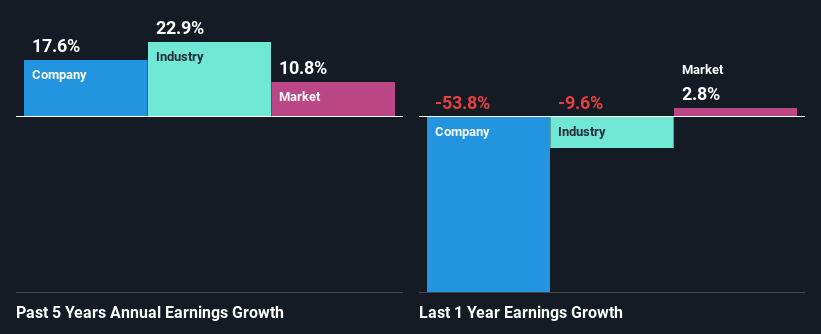Can Mixed Fundamentals Have A Negative Impact on Matang Berhad (KLSE:MATANG) Current Share Price Momentum?
Most readers would already be aware that Matang Berhad's (KLSE:MATANG) stock increased significantly by 12% over the past month. However, we wonder if the company's inconsistent financials would have any adverse impact on the current share price momentum. Specifically, we decided to study Matang Berhad's ROE in this article.
Return on Equity or ROE is a test of how effectively a company is growing its value and managing investors’ money. In other words, it is a profitability ratio which measures the rate of return on the capital provided by the company's shareholders.
See our latest analysis for Matang Berhad
How To Calculate Return On Equity?
The formula for return on equity is:
Return on Equity = Net Profit (from continuing operations) ÷ Shareholders' Equity
So, based on the above formula, the ROE for Matang Berhad is:
1.1% = RM2.6m ÷ RM247m (Based on the trailing twelve months to June 2023).
The 'return' refers to a company's earnings over the last year. Another way to think of that is that for every MYR1 worth of equity, the company was able to earn MYR0.01 in profit.
What Has ROE Got To Do With Earnings Growth?
Thus far, we have learned that ROE measures how efficiently a company is generating its profits. Depending on how much of these profits the company reinvests or "retains", and how effectively it does so, we are then able to assess a company’s earnings growth potential. Generally speaking, other things being equal, firms with a high return on equity and profit retention, have a higher growth rate than firms that don’t share these attributes.
Matang Berhad's Earnings Growth And 1.1% ROE
As you can see, Matang Berhad's ROE looks pretty weak. Even when compared to the industry average of 7.6%, the ROE figure is pretty disappointing. Matang Berhad was still able to see a decent net income growth of 18% over the past five years. Therefore, the growth in earnings could probably have been caused by other variables. Such as - high earnings retention or an efficient management in place.
As a next step, we compared Matang Berhad's net income growth with the industry and were disappointed to see that the company's growth is lower than the industry average growth of 23% in the same period.
Earnings growth is an important metric to consider when valuing a stock. The investor should try to establish if the expected growth or decline in earnings, whichever the case may be, is priced in. By doing so, they will have an idea if the stock is headed into clear blue waters or if swampy waters await. One good indicator of expected earnings growth is the P/E ratio which determines the price the market is willing to pay for a stock based on its earnings prospects. So, you may want to check if Matang Berhad is trading on a high P/E or a low P/E, relative to its industry.
Is Matang Berhad Efficiently Re-investing Its Profits?
The high three-year median payout ratio of 89% (or a retention ratio of 11%) for Matang Berhad suggests that the company's growth wasn't really hampered despite it returning most of its income to its shareholders.
Additionally, Matang Berhad has paid dividends over a period of five years which means that the company is pretty serious about sharing its profits with shareholders.
Summary
In total, we're a bit ambivalent about Matang Berhad's performance. While the company has posted a decent earnings growth, We do feel that the earnings growth number could have been even higher, had the company been reinvesting more of its earnings at a higher rate of return. So far, we've only made a quick discussion around the company's earnings growth. To gain further insights into Matang Berhad's past profit growth, check out this visualization of past earnings, revenue and cash flows.
Have feedback on this article? Concerned about the content? Get in touch with us directly. Alternatively, email editorial-team (at) simplywallst.com.
This article by Simply Wall St is general in nature. We provide commentary based on historical data and analyst forecasts only using an unbiased methodology and our articles are not intended to be financial advice. It does not constitute a recommendation to buy or sell any stock, and does not take account of your objectives, or your financial situation. We aim to bring you long-term focused analysis driven by fundamental data. Note that our analysis may not factor in the latest price-sensitive company announcements or qualitative material. Simply Wall St has no position in any stocks mentioned.

